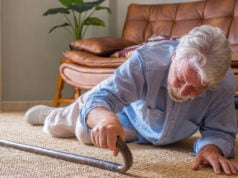
Medically reviewed by Shilpa Amin, M.D., CAQ, FAAFP — By Hana Ames
For a number of reasons, many people may find it more difficult to lose weight after they turn 50 years old. However, various tips can help older adults to maintain a moderate weight.
Many factors contribute to why a person may find it more difficult to lose weight once they enter their 50s.
These factors can include:
- changes in metabolism, which affects how quickly the body burns calories
- reduced muscle mass, which also affects how quickly the body burns calories
- changes in sex hormones, with reduced estrogen causing increased body fat and reduced testosterone contributing to loss of muscle mass
- increased stress levels, which may increase appetite in some people
- higher levels of hunger hormones due to poor sleep
- reduced ability to exercise or not getting enough physical activity
- consuming more calories than their body needs
Certain conditions can also cause a person to gain weight, sometimes due to fluid retention. These include:
- heart failure
- kidney disease
- liver problems
Some medications can also contribute to weight gain or make it harder for a person to maintain a moderate weight. This may be because some side effects affect a person’s appetite. Examples of these medications include:
- antihistamines containing diphenhydramine
- antidepressants such as phenelzine (Nardil) and paroxetine (Paxil)
- antipsychotics such as olanzapine (Zyprexa) and clozapine (Clozaril)
- beta-blockers such as metoprolol (Lopressor) and atenolol (Tenormin)
- sleep aids containing diphenhydramine
It is best for a person to contact their doctor for advice if they believe medication or an underlying condition is affecting their weight.
Learn more about weight loss barriers.
Ways to lose weight after 50
The following sections will describe some ways a person can lose weight and maintain the weight loss after the age of 50 years.
1. Move more
The underlying principle of losing weight is burning more calories than one consumes.
Some research has linked sedentary lifestyles to an increased risk of developing cardiovascular disease, obesity, and poorer health in general.
One significant factor in many people’s sedentary lives is having a job that involves a lot of sitting, such as an office worker, driver, or cashier.
However, studies suggest that taking short breaks every half an hour can help reduce the amount of time they spend sitting and potentially increase their overall health.
Learn more about how to stay active in the workplace.
2. Get enough sleep
Many studies have suggested a link between a lack of good-quality sleep and obesity.
Specifically, they suggest that there is a correlation between short sleep duration, poor quality sleep, and an increased risk of developing overweight or obesity.
Getting enough quality sleep can help to reduce this risk and better manage weight.
Discover tips for sleeping better.
3. Do not skip meals
It may seem like a good idea to skip meals to lower caloric intake, but this can actually prove detrimental to weight loss.
Some studies suggest a link between skipping breakfast and obesity, meaning that there is a chance that skipping meals can lead to a person gaining weight rather than losing it.
4. Park further away
While commuting, try parking farther away from work or the destination. If a person takes public transport, they can try getting off one stop ahead of the regular stop. This can all help someone move more and get in more exercise where possible.
The extra calories the person burns may help them maintain a moderate weight.
5. Enjoy exercise
Finding an exercise they enjoy may be the key to a person continuing to participate in it over the long term, according to some research.
Whether a person prefers yoga, weight training, tennis, or some other form of physical activity, enjoying exercise can help keep a person engaged and make it feel less like work and more like leisure.
Even activities such as gardening help to keep the body moving and can be a pleasurable form of exercise.
6. Buddy up
Consider enlisting a friend who shares the same goals.
Having a social aspect to losing weight or maintaining a moderate weight can often help people stick to their plans more than if doing it alone.
7. Avoid sugary snacks
Instead of reaching for sugary foods when a person is hungry, they could try consuming healthier snacks, such as nuts.
Some studies suggest that eating healthy portions of nuts regularly does not impact a person’s body weight, whereas snacking on sugary foods is more likely to lead to weight gain.
Learn more about foods to avoid when trying to lose weight.
8. Set realistic goals
It is important that a person does not try to lose too much weight too quickly or push themselves too hard to hit unrealistic fitness goals.
Not reaching ambitious goals could lead to a person feeling discouraged. They may be less likely to stick to their diet and exercise routine if they do not see the results they were hoping for straight away.
Instead, people should work up to these ideal goals by setting smaller, more realistic goals along the way.
9. Lift weights
Aging may lead to a loss of muscle mass and strength. This means that weight lifting and strength training may be beneficial for older adults to help maintain a moderate body weight.
Weight lifting also promotes bone strength, which can help prevent injuries, making it easier for a person to stick to their exercise routine.
10. Use fitness technology
Using a pedometer or smartwatch, a person can track their daily steps. Tracking their steps may help a person feel more motivated as they watch their daily steps increase over time.
Step tracking can also help people calculate how many calories per day they are burning so that they can accurately calculate their caloric needs for weight loss.
Learn more about step tracking and how it can aid weight loss.
11. Consume more protein
Some studies show that eating more protein when trying to lose weight can help older adults lose more fat and keep more muscle mass than if they eat a lower protein diet.
A person may wish to contact a dietitian for advice on how they can add more protein to their diet.
Learn about foods high in protein.
12. Lower stress
Researchers have linked high stress to food cravings and excessive food intake.
People experiencing high levels of stress may eat as a form of comfort, and this can make it difficult to lose weight or maintain a moderate weight.
Stress also causes the body to produce the hormone cortisol. Researchers have associated high cortisol levels with weight gain, particularly around the abdomen and face.
Reducing stress levels can help a person maintain a moderate weight.
13. Fill up on fruits and vegetables
Observational studies suggest that a higher intake of fruits and vegetables is linked to better muscle function.
Not only are fruits and vegetables mostly low in calories, but they also contain many essential nutrients to help the body function better, and they may help reduce the risk of many conditions.
Learn about ways to manage stress.
14. Opt for whole grains
One way to lose more weight is to cook using healthy ingredients. For example, rather than opting for processed foods, a person may choose whole grains.
Some studies suggest that eating whole grains can significantly reduce overall energy intake and body weight in adults with overweight.
Learn more about the health benefits of whole grains.
15. Hire a personal trainer
A lack of motivation may prevent a person from losing weight after the age of 50 years, but hiring a personal trainer may help.
Personal trainers can keep people accountable and also advise on the best methods to lose weight.
However, hiring a personal trainer can also be expensive. If this is not an option, try to find a coach who posts videos on YouTube or another video site and follow those instead.
16. Take up yoga
Some research suggests that gentle forms of exercise can help a person lose weight.
Low-impact exercises — such as tai chi, yoga, and Pilates — may benefit those who want to lose weight but who are unable to participate in higher-impact exercise.
Learn more about yoga and weight loss.
17. Eat mindfully
Eating mindfully can be an impactful method for weight loss.
Often, people eat while doing other things. Whether eating while working at the desk or watching television at mealtimes, concentrating on something else while eating can cause a person to overeat.
This is because they are less likely to concentrate on how they are feeling and may continue to eat after they feel full.
This suggests that mindful eating may be beneficial for weight loss or management by helping a person recognize when they feel full.
18. Cut out sugary drinks
Consuming carbonated sugary drinks such as soda, or even some fruit juices, can mean that a person is drinking a lot more sugar than they may be aware of. This can make it difficult to lose weight.
People can opt for water or herbal teas to stay hydrated while losing weight.
19. Eat out less
It may be difficult to know what goes into a meal if people are eating out. This is because restaurant dishes may contain hidden ingredients and extra fats and sugars that people do not account for.
Staying in and cooking more food at home means that a person can be sure of what goes into their meals and, therefore, their body.
When a person does eat out, they may benefit from avoiding dishes that are typically higher in calories, such as battered or deep-fried foods. Ordering just one course and choosing smaller portions may also help.
20. Get tested
If a person is still finding it difficult to lose weight after the age of 50 years, it may be worth consulting a healthcare professional for a checkup.
A doctor can order tests to rule out any underlying conditions, such as polycystic ovary syndrome or any issues with the thyroid.
Although it can be more difficult to lose weight after a person reaches 50 years of age, there are many lifestyle changes that they can make to help them reach and maintain a moderate weight.
These include cooking more meals at home, cutting down on sugary drinks and snacks, and getting more physical activity.
A person’s doctor can also help them identify any underlying factors that may be contributing to weight gain or making it harder to lose weight.
Disclaimer
The information contained in South Florida Reporter is for general information purposes only.
The South Florida Reporter assumes no responsibility for errors or omissions in the contents of the Service.
In no event shall the South Florida Reporter be liable for any special, direct, indirect, consequential, or incidental damages or any damages whatsoever, whether in an action of contract, negligence or other tort, arising out of or in connection with the use of the Service or the contents of the Service. The Company reserves the right to make additions, deletions, or modifications to the contents of the Service at any time without prior notice.
The Company does not warrant that the Service is free of viruses or other harmful components












